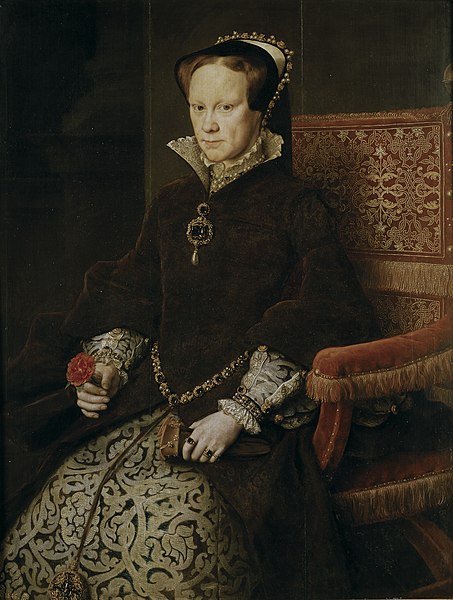 1
1title: Maria Tudor1
artist: Antonis Mor
current location: Sala 056
source: [link Museo del Prado] Catalog no. P02108 [link]
credit: Museo del Prado Catalog no. P02108 [1]
description: portrait of queen Mary I of England, by Antonis Mor, 1554.
license:Public domain
 2
2title: Elizabeth, Queen of Bohemia from NPG
artist: Unidentified painter
credit: one or more third parties have made copyright claims against Wikimedia Commons in relation to the work from which this is sourced or a purely mechanical reproduction thereof. This may be due to recognition of the "sweat of the brow" doctrine, allowing works to be eligible for protection through skill and labour, and not purely by originality as is the case in the United States (where this website is hosted). These claims may or may not be valid in all jurisdictions. As such, use of this image in the jurisdiction of the claimant or other countries may be regarded as copyright infringement. Please see Commons:When to use the PD-Art tag for more information.
description:
portrait of Princess Elizabeth Stuart, later queen of Bohemia, called the Winter queen.
Elizabeth's standing collar of reticella is worked with the Royal coat of arms with its lion and unicorn supporters. She wears a gown of Italian silk brocade. The black armband is thought to be a sign of mourning for her brother Henry Frederick, Prince of Wales who died in 1612. (Notes after Aileen Ribeiro, Fashion and Fiction: Dress in Art and Literature in Stuart England, Yale, 2005.)license:Public domain
 3
3title: Felipe V e Isabel de Farnesio
artist: unknown
medium: Oil on canvas
dimensions: size cm 181 260
current location: Institution:Museo del Prado Depositado en el Institution:Palacio Real de Riofrío
source: [link]
credit: [3]
description: portrait of Philip V and Elisabeth Farnese, King and queen of Spain

license:Public domain
 4
4title: Queen Elizabeth the Queen Mother portrait
artist: Richard Stone
source: Wayback |1=link |2=|date=20080508173602
credit: archive copy
description:
portrait of queen Elizabeth (1900–2002)license:Public domain
 5
5title: François Clouet Mary, Queen of Scots (1542-87) - Google Art Project
artist: François Clouet
date: from 1558 until 1560
current location: The Royal Collection, London
credit: YQExprz3sIBJ8A at Google Cultural Institute maximum zoom level
license:Public domain
 6
6title: Ptolemaic Queen (Cleopatra VII?), 50-30 B.C.E., 71.12
artist: unknown
source: Brooklyn Museum
credit: Brooklyn Museum
description: Egyptian portrait of a Ptolemaic queen, possibly Cleopatra, c. 51–30 BC, located in the Brooklyn Museum

license:Public domain
 7
7title: Two English queens and Philip (1908) (14781645524)
artist:
date: 1908
source: link * Source book page: link
credit: link Source book page: link
description:
Identifier: twoenglishqueens00hume (find matches)
Please note that these images are extracted from scanned page images that may have been digitally enhanced for readability - coloration and appearance of these illustrations may not perfectly resemble the original work.
Title: Two English queens and Philip
Year: 1908 (1900s)
Authors: Hume, Martin Andrew Sharp, 1847- (from old catalog)
Subjects: Philip II, King of Spain, 1527-1598 Mary I, queen of England, 1516-1558. (from old catalog) Elizabeth I, queen of England, 1533-1603
Publisher: New York, G. P. Putnam's sons (etc., etc.)
Contributing Library: The Library of Congress
Digitizing Sponsor: The Library of Congress
View Book Page: Book Viewer
About This Book: Catalog Entry
View All Images: All Images From Book
Click here to view book online to see this illustration in context in a browseable online version of this book.
Text Appearing Before Image:
l methods she might avoid war, even at this eleventh hour. The damage done by Drake was in great part irreparable. Not only were many stores and ships destroyed in Cadiz, but for weeks afterwards the English fleet lay off the coast of Portugal,capturing great numbers of vessels loaded with pipestaves, for the water and wine casks of the Armada.These could not be quickly replaced, and their loss led to the short and bad water supply in the fleet, which was one of its worst calamities. When Drake sailed away, Spain was crippled for a time ; and the capture of the rich Indies galleon, San Felipe, completed the discomfiture of King Philip, who had no alternative now but to order Santa Cruz to make ready his ships To prove the importance of this point, one of Mendoza's arguments in favour of the proposal of Huntly and the Scottish Catholics to attack England across the Border by land instead of by an invading fleet, was the great cost of the pipe staves,which he said had already been 150,000 ducats.
Text Appearing After Image:
queen ELIZABETH from THE PAINTING BY MARC GHEERAERTS AT THE NATIONAL portrait GALLERY - PARMA AND THE ARMADA 465 in Lisbon, in a hurry, not now to invade England, but to prevent Drake from intercepting and plundering the silver fleet, whose safe arrival in Spain would alone enable Philip to proceed with his plan of invasion in the following year. The injury inflicted by Drakes raid was a terrible one to Philip, but he plodded on, still convinced of the goodness of his methods and the ultimate certain victory of his cause. To Parma, in Flanders, the news of Drakes attack brought anguish and discouragement beyond words,for he was less blinded by fervour than his uncle was,and was brought nearer to his practical difficulties.He was a great commander and saw plainly the weak points of Philips scheme for the Armada, so far as it was communicated to him. A divided command and strictly limited authority were repugnant to him, a sovereign Prince and practically supreme in Spanish Flanders; and from the first h
Note About Imageslicense:
No restrictions
 8
8title: Two English queens and Philip (1908) (14783994575)
artist:
date: 1908
source: link * Source book page: link
credit: link Source book page: link
description:
Identifier: twoenglishqueens00hume (find matches)
Please note that these images are extracted from scanned page images that may have been digitally enhanced for readability - coloration and appearance of these illustrations may not perfectly resemble the original work.
Title: Two English queens and Philip
Year: 1908 (1900s)
Authors: Hume, Martin Andrew Sharp, 1847- (from old catalog)
Subjects: Philip II, King of Spain, 1527-1598 Mary I, queen of England, 1516-1558. (from old catalog) Elizabeth I, queen of England, 1533-1603
Publisher: New York, G. P. Putnam's sons (etc., etc.)
Contributing Library: The Library of Congress
Digitizing Sponsor: The Library of Congress
View Book Page: Book Viewer
About This Book: Catalog Entry
View All Images: All Images From Book
Click here to view book online to see this illustration in context in a browseable online version of this book.
Text Appearing Before Image:
n religion. . . . You will enforce this by all the good arguments and persuasions that you can employ, but if you can obtain no success in that way you will consider whether it will be well to press the queen by saying that if this change is made, all idea of my marriage with her must be broken off. If she has any thoughts that way this may be effective. 2 Feria was in a quandary, for he knew how impossible it was, seeing Elizabeth's temper, to deal with her in this way. After two or three inconclusive interviews with the queen, in which the question of the religious changes was pressed and the marriage broadly hinted at, Feria came to close quarters with her. She began with her usual professions of disinclination to marry at all, and was proceeding, as he feared, to decline her brother-in-laws proposal, when the ambassador ^ The English correspondence on this matter is of much interest. It is in Forbess State Papers. = Philip to Feria, 14th February, 1559.—Spanish Calendars of Elizabeth (Hume).
Text Appearing After Image:
queen ELIZABETH FROM A PAINTING BY ZUCCHERO IN THE NATIONAL portrait GALLERY. ELIZABETH AND FERIA 193 stopped her and said he did not want an answer then. After some coquettish verbal fencing she promised him that she would give him a good answer if she gave him one at all. And then came the serious part of the business. Howard had written to her that Alba had said that they (the Spaniards) could not stand out for Calais any longer, but must make peace in any case. Elizabeth worked herself up into a rage about this,and began to storm about Mary of Scotland's claims upon England. She was not so poor that she could not get what money and soldiers she needed to hold her own, she said. Her people were all grumbling, she declared, at the waste of money upon the fleet for Philips service and other heavy expenditure the late queen had incurred for him; and Feria had much a do to enforce his view that England owed a deep debt of gratitude to Philip, and the unreasonableness of expecting that he would keep a
Note About Imageslicense:
No restrictions
 9
9title: Catherine of Bragança, infanta of Portugal, & queen consort of England - Queen Catherine of Bragança
artist: Benedetto Gennari II
date: between circa 1672 and circa 1673

source: link *author: Lillias Campbell Davidson, 1908
credit: link author: Lillias Campbell Davidson, 1908
description: portrait of Marie Anne Mancini (1649-1714), misidentified with Catherine of Braganza (1638-1705).
queen Catherine of Bragança. From the original by H. Gascar in the National portrait Gallery.license:Public domain

title: Armada Portrait Elizabeth I Queens House
artist:
date: 1588
dimensions: size unit= height= width=
source: [link Image]
credit: Image
description: The queen's House version of the Armada portrait of Elizabeth I after conservation in 2016-2017.
license:Public domain





